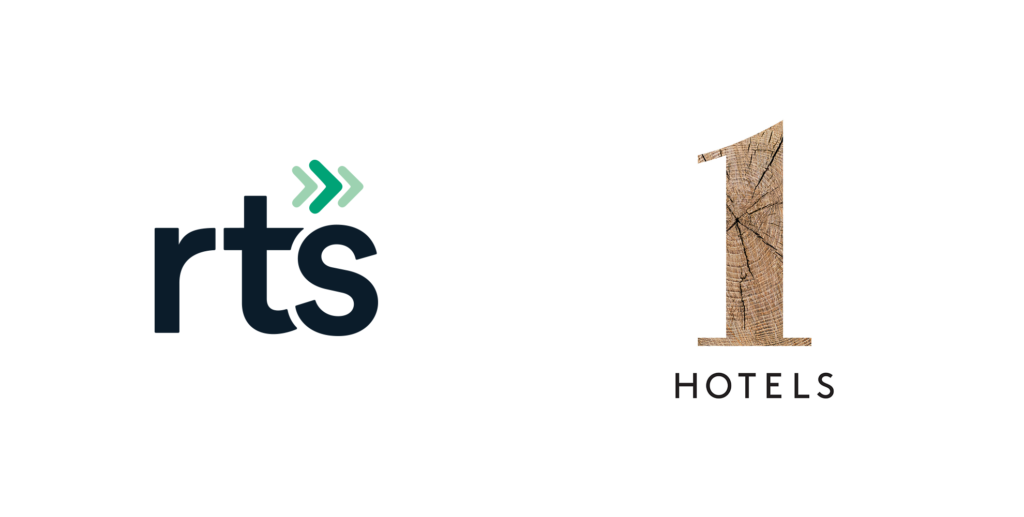Many companies are reevaluating their sustainability goals and making both big and small changes to guarantee their impact on the environment is minimal. Here we sit down with one of our favorite, sustainability-forward clients and dive into their initiatives!
Corinne Hanson, Global Corporate Director of Sustainability and Impact at SH Hotels & Resorts discusses 1 Hotels’ history, recycling initiatives, and its mission to eliminate waste.

Q: Why was 1 Hotel Group Formed?
A: As a luxury lifestyle hotel brand inspired by nature, 1 Hotels cultivates the best of sustainable design and architecture, together with extraordinary comfort and an unrivaled level of service. 1 Hotels launched in 2015 with the opening of exclusive properties in Miami’s South Beach and Manhattan’s Central Park, followed by Brooklyn, located on the East River, in February 2017, and West Hollywood on Sunset Boulevard, in June 2019. 1 Hotels was inspired by a simple idea: those that travel the world should also care about it. It is, after all, 1 World. 1 Hotels upholds this vision by channeling nature through design and culinary partnerships, connecting with the local community and taking sustainable steps to make a difference in our buildings and operations.
Q: How do your business practices align with your mission and values for the hotel group?
A: 1 Hotels is not just a brand, it’s a cause. A cause built off a simple idea: the world around us is beautiful and we want to keep it that way. We’ve designed our hotel and products to highlight the startling beauty of nature, fusing luxury with responsibility, to create refreshing experiences.
Q: How do you balance profitability and sustainability?
A: Sustainability leads to profitability. Managing the upfront cost of renovations, retrofits, and other investments are imperative, and every decision we make for sustainability saves resources, and those resources cost money. When you also consider the value of the natural ecosystems in which we operate, the value of the health of our guests and our teams, and the value of a sustaining property that guests want to travel to because of its commitment to sustainability, you begin to realize the true value and profitability of sustainability.
Q: What pushed you to streamline your waste management systems?
A: Waste is a huge part of sustainability because the most sustainable product in the world could still have a tremendously negative impact if it ends up in a landfill. Sustainability is core to our DNA and operations, and we are committed to ensuring that our operations minimize the impact on the environment. Miami’s waste services pose several challenges, and we want to make sure we’re doing everything we can.
Q: What were your ambitions and goals when you began this project?
A: We wanted to gain clarity on our opportunities to minimize waste to landfill and optimize recycling. We want to be leaders who promote zero waste in hospitality and share our learnings with our guests.
Q: How have staff reacted to your efforts to improve existing systems?
A: Our team members who worked with RTS were very engaged in the trainings. They asked many questions as they had a great interest in learning how to properly recycle. Our team members take pride in knowing that we are looking for ways to improve our processes to better the environment.
Q: How many sites have been included in your plans, and do you intend to standardize procedures across all sites?
A: We are currently trialing our process with RTS in South Beach and exploring options to roll out similar engagements across our other properties.
Q: Are there certain waste streams/products/materials that are more problematic for you to deal with?
A: We wanted to find a solution for our glass waste as we were aware glass is a challenging stream to recycle. Rather than risk the chance that this glass waste would be sent to landfill, we worked with RTS to identify alternative streams and use a glass crusher to convert this waste to usable “sand”.
The team has also learned to handle cardboard carefully to avoid contamination from other recyclables or waste. To produce clean and valuable cardboard, ensuring that this material is recycled and avoiding contamination fees from our waste management services, the team implemented a cardboard baler at the hotel.
The compostable items such as single-use food containers, utensils, and cold and hot cups do not have a compost facility option to be sent to therefore they must go to the trash. Because of the appearance of the items, they almost always wind up in the recycling container which contaminates the actual recyclable items. There are currently no composts accepting these items in the state of Florida.
Hard to recycle materials such as water filters, air filters, washers, dryers, dishwasher filters, stoves, ovens, and microwaves – we are currently exploring a program to best recycle or donate these items.
Q: Are there certain waste stream/products/materials that need to be disposed of according to local/national laws?
A: The glass disposal stream is one challenge specific to Miami. Another significant challenge comes from the lack of composting services in Miami. As a brand we want to be able to minimize waste by offering compostable materials in our to-go and takeaway food and beverage outlets. However, doing this when there is not a compostable waste stream in the city means that we will be generating additional waste, rather than reducing it. We are identifying third parties that have a market for compostable materials while also minimizing our use of these items.
Q: How has technology helped you implement your plans?
A: We currently use an ORCA organic waste processing machine. This technology is an efficient waste to water system that also tracks waste data and allows us to compare year over year improvement.
Q: How has the Coronavirus crisis affected the implementation of your plans?
A: COVID-19 has had several impacts on our plans. While lower occupancies equate to a temporary reduction in the amount of total waste produced on property, the whole world is grappling with the disposal of single-use health and safety materials such as wipes, individually wrapped items, and disposable masks. All cleaning agents we use are EPA approved, like EcoLab’s Peroxide Multi-surface cleaner and disinfectant and or the Hygeia Spray Bottle, which minimizes waste by allowing you to fill a bottle with water to activate the hydrogen cleaning agent.
Q: Are there specific protocols you must now follow relating to cleaning the hotel in light of Coronavirus?
A: We’ve always used EcoLab cleaning products but there are several different protocols that we have implemented in order to ensure the safety of teams and guests. You can find a full list of our measures and protocols here.
Q: How are you dealing with waste generated because of the protocols and procedures?
A: The only waste generated is the masks and gloves because all the chemical containers and bottles are reusable. We send all PPE waste to TerraCycle.
For more information on how RTS can help your business leverage education to become more sustainable, contact our team of TRUE Advisors today who will discuss your specific needs and how they can be addressed. Additionally, for more information on recycling, sustainability, zero waste, and the circular economy, explore our resources here.

